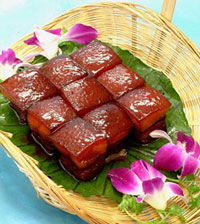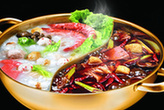
Dongpo is the pen name of Su Shi (1037-1101), a prominent writer of the Northern Song Dynasty (960-1127). His father Su Xun was also a highly regarded writer and personally tutored him from an early age. Su Shi took part in the imperial exam at 19, and achieved exceptionally high marks. This success won him a judicial position in the government. Years later a new emperor took the throne and introduced sweeping political reforms at the proposal of Prime Minister Wang Anshi. Appalled at the suffering of the people under the new policies, Su Shi sent a petition to the emperor railing against their implementation. In 1079 he was thrown into prison for his poems satirizing the new policies. Later, he was exiled to Huangzhou in Hubei Province, serving as a petty functionary.
While serving as deputy militia commissioner in Huangzhou, Su Shi reclaimed wasteland and did farmwork, calling this plot of land on hillside “Dongpo” (Eastern Slope) and naming himself “Dongpo Jushi” (Dweller of the Eastern Slope). There he developed his own recipe for stewed pork and wrote a poem about it.
But it wasn’t until years later that his method of cooking became better known far and wide. By that time China was under the rule of a new emperor and Su Shi had been appointed magistrate of Hangzhou. When a downpour one summer overflowed the drainage system of the West Lake and inflicted heavy damages on crops, Su Shi took several measures to minimize the losses during and after the deluge. To show their gratitude, local people sent him a large amount of pork and wine during the Spring Festival. Inundated with all this food and drink, Su Shi taught chefs to prepare the pork using his method and sent out portions of the dish to everyone who had participated in the dredging of the West Lake. They all liked it, and named it “Dongpo Pork.” The dish later spread all over the nation and has remained popular to date.
Method:
Boil a slab of streaky pork for 30 minutes, and then cut it into cubes. Scatter sliced shallots and ginger in a clay pot, and place pork cubes skin downward over them. Add soy sauce, crystal sugar, rice wine and more sliced shallots on top. Cover with a lid and turn on the heat to maximum until it starts to boil and then cook on a low flame for two hours. Transfer the pork to a covered clay jar and steam for 30 minutes. The finished dish is succulent but not oily.
Source: China Today





Why not rent a boyfriend, or girlfriend to please parents during the Spring Festival?